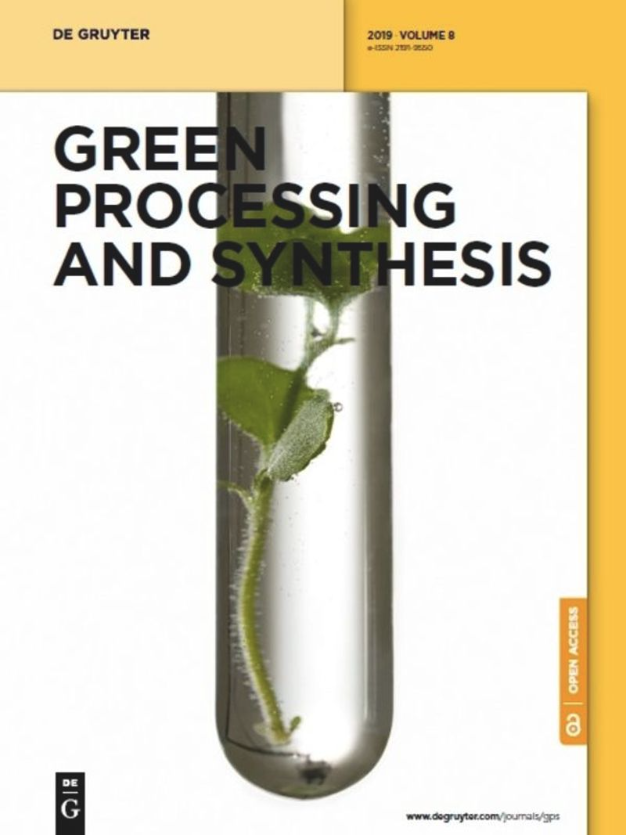Green-processed nano-biocomposite (ZnO–TiO2): Potential candidates for biomedical applications
IF 3
4区 工程技术
Q2 CHEMISTRY, MULTIDISCIPLINARY
引用次数: 0
Abstract
Abstract Nanotechnology investigates different promising methodologies in the space of material sciences on a sub-atomic level. Novel methodologies are expected for the accomplishment of protected and successful helpful medicines past the traditional ones, and society needs new prerequisites for innovations, moving towards perfect and green innovation improvement. This review study deals with topics related to green nanotechnology for the investigation of different assays such as anticancer, antidiabetic, anti-larval, and microbial. The confirmation of nanocomposite will be conformed using scanning electron microscopy, energy-dispersive X-ray spectroscopy, Fourier transform infrared spectroscopy, and X-ray diffraction to determine the size, shape, and supporting material to stabilize and cap the agent. However, the biomedical application of the ZnO/TiO2 nanocomposite is also discussed. Furthermore, to their remarkable biocompatibility, ZnO/TiO2 has shown significant potential in bio-imaging, tissue engineering, and drug delivery. The biological activities of the green-produced nanoparticles are strong and they are employed in several biological applications across various assays. The current review covers the creation and most recent developments of bio-nanocomposite materials from plant sources (such as leaves, stems, bark, roots, rhizomes, fruits, flowers, and seeds), as well as their anti-cancer, diabetes-related, and anti-larval activities. This is followed by a thorough discussion of their mechanisms of action.绿色加工纳米生物复合材料(ZnO–TiO2):生物医学应用的潜在候选者
摘要纳米技术在亚原子水平上研究材料科学领域中不同的有前景的方法。新的方法有望超越传统方法,获得受保护和成功的有益药物,社会需要创新的新先决条件,朝着完善和绿色创新的方向发展。这项综述研究涉及与绿色纳米技术相关的主题,用于研究不同的检测方法,如抗癌、抗糖尿病、抗幼虫和微生物。纳米复合材料的确认将使用扫描电子显微镜、能量色散X射线光谱、傅立叶变换红外光谱和X射线衍射来确定尺寸、形状和支撑材料,以稳定和覆盖试剂。然而,还讨论了ZnO/TiO2纳米复合材料的生物医学应用。此外,由于其显著的生物相容性,ZnO/TiO2在生物成像、组织工程和药物递送方面显示出巨大的潜力。绿色生产的纳米颗粒的生物活性很强,它们被用于各种测定中的多种生物应用。目前的综述涵盖了来自植物来源(如叶、茎、树皮、根、根状茎、果实、花和种子)的生物复合材料的产生和最新发展,以及它们的抗癌、糖尿病相关和抗幼虫活性。随后对其行动机制进行了深入讨论。
本文章由计算机程序翻译,如有差异,请以英文原文为准。
求助全文
约1分钟内获得全文
求助全文
来源期刊

Green Processing and Synthesis
CHEMISTRY, MULTIDISCIPLINARY-ENGINEERING, CHEMICAL
CiteScore
6.70
自引率
9.30%
发文量
78
审稿时长
7 weeks
期刊介绍:
Green Processing and Synthesis is a bimonthly, peer-reviewed journal that provides up-to-date research both on fundamental as well as applied aspects of innovative green process development and chemical synthesis, giving an appropriate share to industrial views. The contributions are cutting edge, high-impact, authoritative, and provide both pros and cons of potential technologies. Green Processing and Synthesis provides a platform for scientists and engineers, especially chemists and chemical engineers, but is also open for interdisciplinary research from other areas such as physics, materials science, or catalysis.
 求助内容:
求助内容: 应助结果提醒方式:
应助结果提醒方式:


